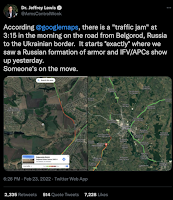The problem with the future lies in its navigation system. Let me explain. In my Jeep’s navigation system, I put in my destination and it efficiently proposes routes (preferably over mountains and rivers. The future, however, uses different inputs. It takes inputs from innovations in science and technology, and mixes them with developments in the societal, geopolitical and economic domains, adds fast changing consumer preferences and behaviors, VC investments, profit motivations, and then sprinkles in some additional earth-shaking catalysts like depressions, wars, pandemics, insurrections, and economic crisis. Where will that navigation system take us? Who knows!? You can see why it’s a fool’s errand to make predictions about the future.
The future’s navigation system is either broken, or we just don’t know how to use it. It seems to lack a key field – a destination field. A field where we can specify a place we want to go where humans flourish, develop in healthy ways, in a favorable environment and that is filled with abundance and joy. If we can find that input field, we should add that destination!
Many of us have given up on navigating to our desired future. We’ve stopped trying and turned our attention to learning how to best react to whatever comes along on the road to nowhere. As chaotic and complex as our world is, that still doesn’t seem to be our best option. As stewards of our civilization and our children’s future, it seems having a desired destination where humans flourish, and choosing the most efficient, equitable and safe routes to get us there would still be in everyone’s best interest.
************************************************************************
Kevin Benedict
Partner | Optimistic Futurist at TCS
***Full Disclosure: These are my personal opinions. No company is silly enough to claim them. I work with and have worked with many of the companies mentioned in my articles.





